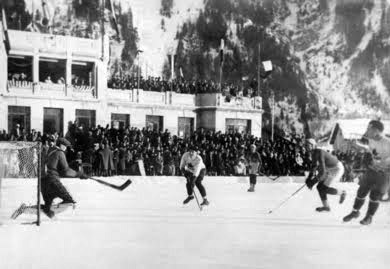Kenneth Strath Moore, hockey player, coach (born 17 February 1910 in Balcarres, SK; died 8 December 1981 in Winnipeg, MB). Ken Moore played on and coached teams that won national championships. As a member of the hockey team representing Canada at the 1932 Winter Olympics, Moore is the first Indigenous athlete from Canada to compete at a Winter Olympics and to win an Olympic gold medal. (See also Indigenous Olympians.)

Early Years
Kenneth Moore was born in Balcarres, a small town in Southern Saskatchewan. He was a member of the Peepeekisis Cree Nation. His two older brothers were taken from the family and forced to attend the Brandon Indian Residential School that was over 330 km away. The eldest, Oliver, was transferred to a sanatorium, where he died in 1922 after falling ill at the school. The other brother, Chester, died at the school. Moore’s parents moved the family from Peepeekisis to Regina, Saskatchewan, to save their other children from being taken to residential school. The residential school in Regina had closed before the Moore family moved to the city.
Moore was always passionate about sports and became a gifted athlete. While he excelled at speed skating, track and field, lacrosse, baseball, rugby and basketball, his first love was hockey. His character and ability as a strong right-winger impressed all who saw him play with the Regina Junior Hockey Association. He was awarded the Eilers’ Medal; chosen by fans as the “cleanest athlete” and one who demonstrated the best sportsmanship.
Moore earned athletic scholarships to a number of American universities but accepted a scholarship to attend Region College and Campion College (University of Saskatchewan) in Regina. He did quite well academically and was elected captain of the varsity rugby and hockey teams. Reports deemed him the college’s “most versatile athlete.” Moore’s accomplishments are all the more impressive considering how few Indigenous people in Canada at the time were allowed to attend post-secondary schools. At times in Canadian history, Indigenous people had to give up their Indian Status and get permission of the local Indian agent in order to attend post-secondary school. (See also Enfranchisement.)

Hockey Career
Ken Moore was signed to play with the Regina Pats of the junior level Western Hockey League. In the 1930 National Junior Hockey Championship final game, Moore scored the winning goal with only 40 seconds left to play, winning the Memorial Cup for the Pats. The next season saw Moore move to a senior-level amateur league, where he played with the Winnipeg Hockey Club, more popularly known as the Winnipegs. The team won the 1931 national championship, taking home the Allan Cup.
The Winnipegs were chosen to represent Canada at the 1932 Winter Olympics, held in Lake Placid, New York. Moore played in one game and scored a goal in Canada’s 10–0 shutout championship game against Poland, securing the gold medal.
Moore’s participation in the Lake Placid games meant that he was the first Indigenous athlete to represent Canada at a Winter Olympics and the first Indigenous athlete from Canada to win an Olympic gold medal. The Winnipeg Hockey Club was later inducted into the Manitoba Sports Hall of Fame and the Manitoba Hockey Hall of Fame.
Moore continued his successful amateur hockey career, playing in British Columbia with the Kimberley Dynamiters. Moore won a second Allan Cup when, in 1936, he assisted on the winning overtime goal to defeat Sudbury and win the national championship. It was the first time a British Columbia team had won the Allan Cup. The team was later inducted into the British Columbia Sports Hall of Fame.

Retirement
After retiring as a player, Moore coached a number of teams. He was behind the bench when the St. Boniface Athletics won the 1942 and 1943 Manitoba Amateur Hockey Association’s Junior North Division championships. In 1944, he coached the St. James Canadians when the club won the Junior South championship and then went on to win the Manitoba Provincial Junior Hockey championship. Beginning in the 1950s, Moore continued to volunteer with minor hockey while enjoying a long career with the City of Winnipegas a fire alarm operator.
Personal Life and Death
Moore married Edith Mae McDougall and they had a daughter, two granddaughters and a great-grandson. Despite his many accomplishments, Moore led a quiet life and spoke with no one about his championships or having won an Olympic gold medal. At age 71, Moore died, in Winnipeg, on 8 December 1981. He was interred at the city’s Elmwood Cemetery.
Canada’s Sports Hall of Fame Controversy
After Moore’s passing, his granddaughter Jennifer Moore Rattray, found among his effects the 1932 Olympic gold medal and his old Olympics jersey. After having conducted research and discovered that he was the first Indigenous person from Canada to have participated in a Winter Olympics and to have won an Olympic gold medal, she twice nominated him for induction into Canada’s Sports Hall of Fame. Both nominations were unsuccessful.
In 2015, Canada’s Sports Hall of Fame inducted Shirley and Sharon Firth with the notation that they were the first Indigenous athletes to represent Canada at the Winter Olympics. Rattray contacted the Hall of Fame about the error but rather than acknowledging Moore, it specified that the sisters were the first Inuit athletes to have represented Canada at the Olympics — they were actually Dinjii Zhuh (Gwich'in).
Rattray is continuing to work to have her grandfather recognized.


 Share on Facebook
Share on Facebook Share on X
Share on X Share by Email
Share by Email Share on Google Classroom
Share on Google Classroom







